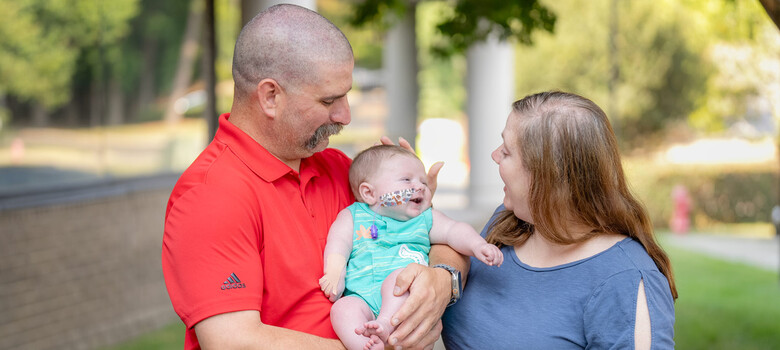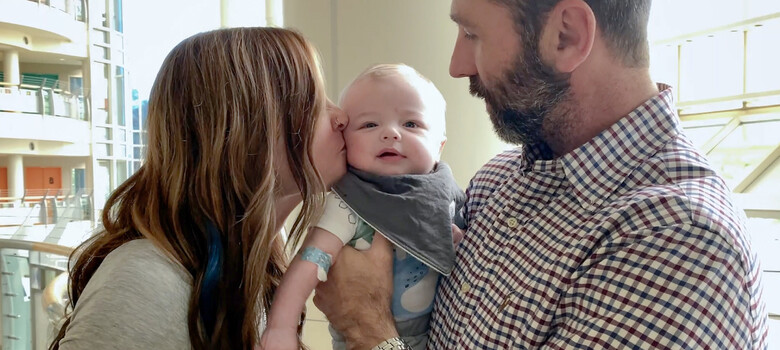How to Evaluate a Pediatric and Congenital Heart Surgery Program

Congenital heart defects are present at birth. These structural defects may require surgery to fix. So how do you find the best care? Here’s what you need to know when evaluating pediatric heart surgery programs and surgeons, and how Duke measures up.
Questions to Ask Your Doctor and Hospital About Pediatric Heart Surgery
Learning that your child has a congenital heart disease is scary. Knowing that your child may need one or more surgeries requires you to make some important decisions, including where to seek care. Here are questions you should ask to help you choose wisely.
What is my child’s specific diagnosis?
Your doctors will likely explain things to you in simple terms, and for good reason -- understanding is key. But for the purpose of comparing hospitals, ask for the proper medical name of the diagnosis (for example, hypoplastic left heart syndrome) so you can learn more on your own later.
What is the scientific name of my child’s procedure? And what is its STAT category?
The Society of Thoracic Surgeons (STS) uses a ranking system of "STAT categories" to group types of surgeries based on their complexity, with 1 being the lowest risk and 5 being the highest risk. Once you know the STAT category of your child’s procedure, review this STS website for information about how well your hospital performs that category of surgery.
For example, the Norwood procedure, which treats hypoplastic left heart syndrome and similar conditions, is a STAT category 5 procedure. According to STS data from January 2020 through December 20231, for the most complex cases (STAT categories 4 and 5), Duke’s survival rates were higher than the STS average rate, an achievement met by only a few U.S. pediatric heart programs.
How many pediatric heart surgeries does this hospital perform each year?
Research shows that hospitals and surgeons who perform more surgeries tend to have better outcomes. This is especially true for higher-complexity cases (STAT categories 4 and 5). In general, you should be looking for a high-volume program, meaning surgeons perform at least 250 relevant procedures annually. In 2023, the Duke team performed more than 450 pediatric heart surgeries.
How many pediatric congenital heart surgeons do you have, and are they board certified?
Hospitals that only have one pediatric heart surgeon on staff may not be able to meet your needs. One person can only cover so many patients simultaneously, especially on weekends or holidays. Duke has multiple board-certified congenital heart surgeons who are skilled in -- and in some cases pioneered -- advanced surgical techniques for repairing children’s hearts.
Does this hospital report its outcomes data publicly?
Publicly reporting outcomes data demonstrates quality, transparency, and a commitment to improvement. Start by searching the STS Congenital Heart Surgery Public Reporting database for your hospital. If it isn’t listed there, beware. Ask where you can find your hospital’s operative survival rates. Remember, lower-risk procedures will have higher survival rates, and higher-risk procedures will have lower survival rates. Duke has reported its congenital cardiac surgery outcomes data to the STS since 2006.
Do you have a cardiac intensive care unit specifically for children?
Pediatric patients have unique needs. As you can imagine, children can be quite fragile and vulnerable while recovering from heart surgery, and it's important to have an experienced team managing their care. Duke Children’s new state-of-the-art, 20-bed Pediatric Cardiac Intensive Care Unit (PCICU) is one of the most technologically advanced in the state. Physicians and providers in the PCICU have advanced specialty training in caring for children with heart defects.
Are your nurses, cardiologists, anesthesiologists, and perfusionists trained in pediatrics?
Having a top-quality surgeon is important, but pediatric heart surgery takes a village. You want all your providers to be experts in pediatric heart care. Ask whether the heart care team has regular conferences or meetings to discuss individual patients and next steps. At Duke, our board-certified pediatric cardiologists and pediatric cardiac anesthesiologists have the advanced training and experience to deliver the best care for your child. In fact, given our expertise, we continuously train the next generation of pediatric cardiologists through our fellowship program.
In addition to pediatric heart surgery, we provide world-class pediatric heart care, including ultrasound and MRI heart imaging, heart catheterization and interventions (like angioplasty and stents), and arrhythmia treatments (like catheter ablation and pacemaker implantation).
Why should we choose this hospital?
You get to decide where your child will receive care, so don’t be afraid to ask questions. Duke Children's is one of a small number of U.S. facilities -- and one of only two in North Carolina -- verified as a Level I Children’s Surgery Center by the American College of Physicians. We believe every child’s case is unique, and it’s our goal to see every child become healthy -- especially yours.
1 Data Analyses of The Society of Thoracic Surgeons Congenital Heart Surgery Database, Table 16, January 2020 - December 2023.




